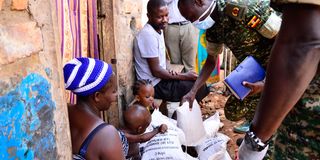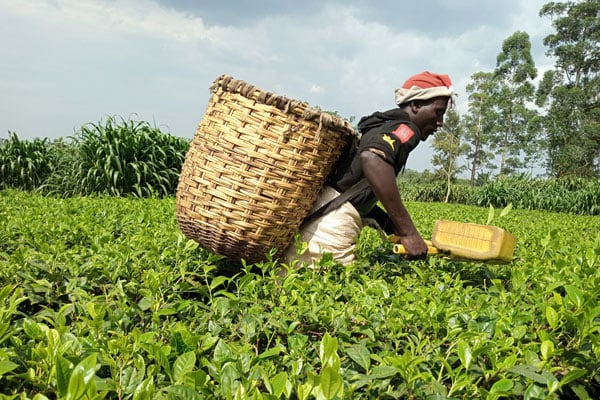Covid-19 promises: What went wrong with implementation?

Soldiers distribute government food relief to families in Bwaise, a Kampala suburb on April 4. PHOTO / ABUBAKER LUBOWA
What you need to know:
Despite promising to deliver free facemasks and other relief items to the public to help them go through the pandemic, in some instances, government did not fulfill its pledge.
In July, Ms Christina Ayikoru, a resident of Yapi Village in Ayivu West Division, Arua City, received two free government facemasks from the area Local Council officials.
When she asked why she was given only two facemasks yet she has four children above the age of six, Ayikoru says the officials asserted they were under instruction to give each family two facemasks.
“We all received two masks and when we protested, they told us to go to the Ministry of Health to get more masks,” Ayikoru said.
For Evelina Sabo, the Local Council officials, just dumped the facemasks at her gate. Sabo had a neighbour who tested positive for Covid-19 and was admitted to Arua Regional Referral Hospital.
“When the LCs came, they just opened the small gate and threw facemasks at us. They said each family should be given four masks. When we tried to inquire, they took off and said we had coronavirus and that they would not talk to us,” she said.
These are not isolated cases. At the onset of the national lockdown occasioned by the Covid-19 pandemic, government made a raft of promises to Ugandans, ranging from free food distribution to masks, learning materials and distribution of radios for home learning. A number of these promises are yet to be implemented.
“The government anti-coronavirus actions of stopping public transport and other measures have put the drivers and other people out of work. Besides, many of them live hand to mouth... Without those activities, especially in the towns, such people may not be able to buy food. The government, after properly identifying these people, will distribute food to them in form of kahuunga (maize flour), beans, powder milk, sugar, salt, etc., in the meantime,” President Museveni said in his third Covid-19 address after he announced a nation-wide lockdown.
However, government ended up only distributing foodstuff to a section of residents in Kampala, Wakiso and Mukono, districts leaving out the rest of urban poor.
Asked how far the food distribution process went, Mr Francis Musa Ecweru, the State Minister for Relief and Disaster Preparedness, said the food distribution was stopped after the easing of lockdown.
“When our President eased the lockdown, people were able to get to work and get food, so the distribution was overtaken by events. We also have a more serious problem of floods and the rising water levels so we had to shift focus to that and that is what we are currently responding to,” he said.
However, Ecweru remained silent on where the food donated during the lock down went.
In an earlier interview with this newspaper, he had said part of the donations went to the health workers, while the rest had been kept in the government stores.
Government, during the same period, asked people to respond to the pandemic and many Ugandans donated food items and other materials. Supplementary budgets were also approved by Parliament to respond to the pandemic.
On March 31, Parliament approved a Shs284b budget with the Ministry of Health getting (Shs104.2b), followed by Security (Shs77.5b) and Disaster preparedness at (Shs59.4b). Other ministries that received the supplementary budgets included Local Government which got Shs34b, ICT at Shs7b and KCCA Shs2b.
Subsequent supplementary budgets were also approved at later times and of all the Ministries, Departments and Agencies that received the money, only Ministry of Health accounted publicly for the funds received, while the budget for security went into classified expenditure.
Disaster preparedness ministry, ICT, KCCA and others are yet to explain how they used the funds.
In July, KCCA led by Lord Mayor Erias Lukwago put the Kampala minister Betty Amongi to task to explain how she spent Shs1b, an explanation which she is yet to offer.
Opposition activist Dr Kizza Besigye, during the lockdown, while offering workable solutions on how to combat the pandemic, also took issues with the government for reportedly diverting a larger chunk of the supplementary budgets to classified expenditure, which he alleged were being used to fund the ruling National Resistance Movement party campaigns.
Ms Proscovia Nambatya, an advocate of High Court, in an opinion published on CMI, an independent development research institute in Norway, said the allocation of the Covid-19 supplementary budget has opened eyes of many Ugandans to the sectors that the government prioritises during budgeting processes.
“In the midst of a pandemic, it has sought to prioritise security over the health and well-being of Ugandans. Although the Ministry of Health is the lead agency in the fight against Covid-19, other ministries and agencies have allocated themselves similar responsibilities in order to get a share of the Covid-19 supplementary budget. This paints a bad picture of a scramble for and partition of public resources. In going as far as allocating itself the contested Shs10b that was not part of the supplementary budget, the Ugandan Parliament acquiesced in the apparent misuse and wastage of public resources,” she wrote.
Reopening of economy
While easing the lockdown in late May, President Museveni said reopening of public transport, schools and other public gatherings would be premised on compulsory wearing of facemasks and with it came the announcement of distribution of freemasks to all Ugandans of six years and above.
“Since many people were expressing concern that they cannot afford to buy these masks and also to ensure quality and avoid sharing, the government has decided to provide them free of charge to all Ugandans of 6 years and above. We shall provide one mask per person of 6 years and above. They must be worn, all the time, when you are in public,” Mr Museveni said on May 18.
“The earliest date possible is a week from (tomorrow), May 19. This, therefore, means May 26, as the best date for the commencement of the relaxation measures for public transport, the opening of shops, the driving of private cars,” he added. However, the programme took more than a month to start, with about 10 companies participating in manufacturing of the masks, Shs33b was allocated for procuring 35 million masks.
While on the Ministry of Health website it is stated that 13.5 million masks have been distributed, Mr Emmanuel Ainebyona, the ministry spokesperson, told this reporter at least 20 million masks have been given out.
“As of now, we have already distributed 20 million masks and the exercise is ongoing. We hope to complete the exercise very soon. We have taken long because some companies could not produce the required amounts in time, so we had to get what they gave us and distribute them. You know some companies could only produce 3,000 masks a day so we had to get more companies to do the work,” he said.
He added: “On the issue of quality, we asked all the companies to produce branded masks so that we know which company is supplying what quality. It was an issue which we addressed with them and I think it has improved.”
Officials square off over radios
With the closure of schools and institutions of learning, government promised to provide free learning materials to all learners.
In addition, government promised to procure 10 million radios and 137,466 solar -powered television sets. Shortly after the pronouncement, Cabinet computed the cost of procurement at Shs300 billion to purchase the radios to be distributed to each household countrywide and the solar-powered television sets to villages.
However, the cost spiralled to Shs336 billion, forcing the parliamentary Budget Committee to twice reject the approval of the funds.
While finalists have resumed studies, other classes are yet to resume and there is no sign that the radios and other home learning materials will be procured anytime soon.
In September, while addressing the nation about Covid-19, the President said all was set to provide the radios to the learners. However, to date, government is yet to procure the radios and the television sets for home learning.
“The government plan for distance learning, through the provision of 9 million radio sets, is on course. The money is available. That route of alternative learning will continue to be consolidated, not only for dealing with the present crisis, but also for the future,” Museveni said.
Parliament blocks the deal
From huge costs of procurement to it being ineffective in delivering the said content to the learners, Parliament, on November 19, finally rejected the budget, effectively ending the hope for procurement of the radios and television sets.
The Members of Parliament had initially accused the ministry officials of inflated cost of procurement of the radios after different ministry officials presented different figures for the same quantity of radios.
The decision to reject the supplementary budget was informed by a report of the Budget Committee, whose findings render purchase of radios an unwise decision on the side of government. The report was presented to Parliament during the sitting of Thursday, November 19.
The committee chairperson, Mr Amos Lugoloobi, told Parliament that an assessment of radio-assisted learning programme conducted by Ministry of Education and Sports indicated that mode of learning was not an effective option in delivering content to learners.
“The report indicated that students and parents were not given an opportunity to directly ask questions and time seemed not to be enough for the teacher, because the teacher was rushed to ensure he concludes the lesson,” said Lugoloobi.
He said the assessment further revealed that some teachers make mistakes that cannot be corrected and that some learners miss out due to competition between gardening and attending lessons in homes.
He said there was no provision in the education ministry’s budget on how the radio-based learning would be operationalised.
“Information on costs of delivery of radios, payment of teachers’ outstanding arrears and other related costs was not presented to the committee,” Mr Lugoloobi said.
He said the committee was perturbed to discover that the identified local manufacturer; Orion Transformers & Electrics did not deal in radio production.
“The committee established that the company’s core activity was production of electrical transformers, no production line was seen for the production or assembly of radios,” said Lugoloobi.
The State Minister for Higher Education, Mr John Chrysostom Muyingo, said the decision to reject the supplementary was unfortunate because many children are still held at home because of the pandemic.
“Over eight million people who are supposed to be at school are still home redundant and nobody knows when this lockdown will come to an end. Some have even been married off while some have started taking drugs out of idleness,” said Muyingo.




